The absence of Anzac footy games gives us all a chance to reflect on the true meaning behind the day
Anzac Day has grown to become a “brand”, especially in the AFL. But with no games being played this year, it gives us a rare chance to truly reflect on what the occasion really represents, writes Graham Cornes.
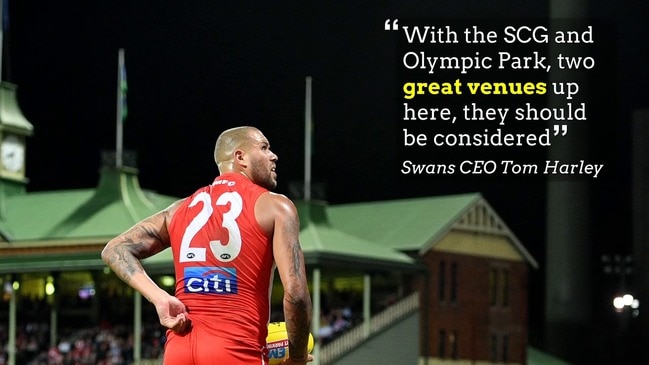
Sport
Don't miss out on the headlines from Sport. Followed categories will be added to My News.
- Why can’t footy be played like it used to?
- How to get the most out of your Advertiser digital subscription
In 2004 as part of the build-up to the Power’s first ever Anzac Day match – against the Western Bulldogs – their coach, Mark Williams, invited me to address his players.
We’d been bitter rivals, as those who lived through those violent Port v Glenelg battles of the late 1980s could attest, but somehow the spirit of Anzac (and time) overrode the acrimony.
Mark Williams had been imbued with that spirit of Anzac by his famous father Fos, who was a returned serviceman, and he so wanted his players to feel it as well.
Watch 15,000+ hours of on-demand sports content with KAYO SPORTS. The biggest Aussie sports and the best from overseas. Just $25/month. No lock-in contract. Get your 14-day trial >
Fos Williams made every effort before the old Magpies Anzac Day clashes to inspire his players with the heroics of the soldiers who had lived through the two great wars.
In the 1960s there was no shortage of war veterans to inspire a footy team.
It’s a little intimidating speaking to a group of players immediately before an important match. Eager, willing faces they may be but they’re not your players.
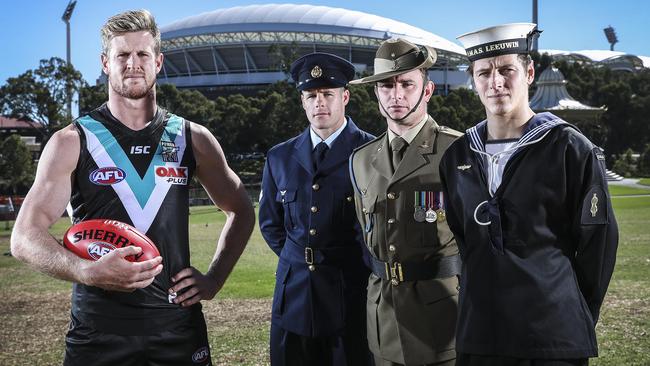
The easy part is to parrot the pillars of service: Courage, Endurance, Mateship and Sacrifice.
They are the words inscribed on the four marble pillars at Isurava, overlooking Kokoda.
It’s a magnificent memorial – something every Australian deserves to see and yes, those four words do relate to footballers.
However, football is not war, the sacrifice is not permanent and footballers are smart enough to know it.
What to tell them that could be relevant to Anzac Day and the football match they were about to play?
So I told them about Robert Hughes and Karl Metcalf.
Bobby Hughes was a young soldier from Port Augusta.
He had been born in Goulburn, NSW, and lived in the Queensland towns of Maryborough, Wynton and Gympie before the family settled in Port Augusta.
Never fond of school, he only ever wanted to join one of the armed services, was knocked back by the navy because he was colourblind so he enlisted in the army.
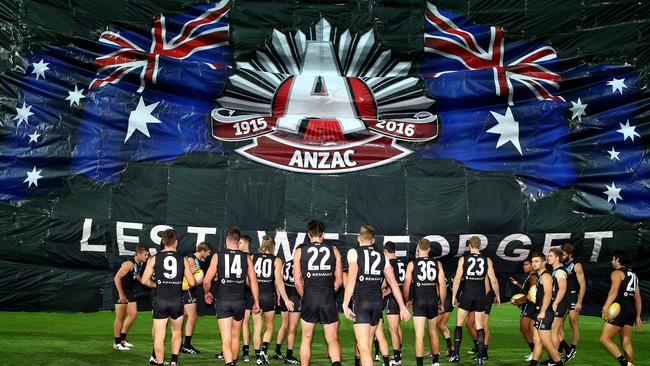
A soldier in the Seventh Battalion of the Royal Australian Regiment in South Vietnam, he was the youngest member of his section which incidentally was commanded by Allan Aldenhoven, a South Australian national serviceman, who would later win the Australian welterweight boxing championship.
On April 22, 1970, Hughesy’s platoon was embroiled in a fierce fire fight as they attacked a Viet Cong bunker system.
He was hit between and above his eyes by shrapnel from a rocket-propelled grenade.
Lieutenant Karl Metcalf his platoon commander, was one of the smallest men in the battalion - a man small in stature but with an immense heart and a huge presence.
He had already been wounded in the buttocks, but with no regard to that wound or his safety, and with extraordinary strength, he picked Hughsey up and carried him out of the line of fire.
The theme of not leaving a mate behind and of being able to perform extraordinary feats when you had nothing left to give and the odds are against you, has some resonance to young footballers.
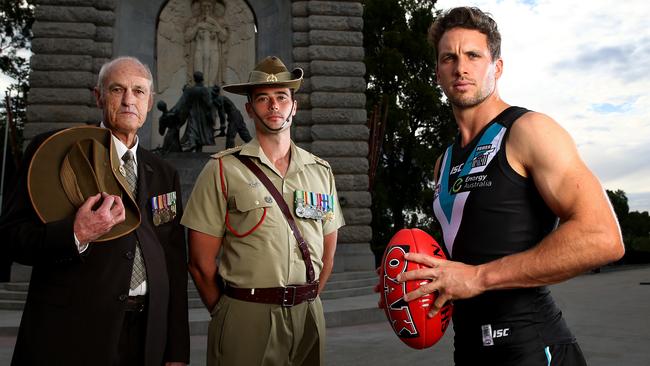
I don’t know if they understood the metaphor but hopefully they understood that Anzac Day was not just about football and great deeds could be performed.
There is an ultimate sadness to the story that I didn’t tell the players on that day.
At 7.30am on April 23, 1970, Robert Hughes’ father, back home in Pt Augusta, received an impersonal telegram saying that his son, Private Robert Edward Hughes, had been placed on “the very seriously ill list” in 24 United States Evacuation Hospital, Long Bihn Vietnam. No other details.
At 4.30pm on the same day another formal, impersonal telegram – a bastard of a telegram from the Minister of the Army, Andrew Peacock – arrived saying his son had died. It was two days before Anzac Day!
This year there will be no football on Anzac Day. In one respect that’s not such a bad thing. The day can stand alone.
Of course we miss the footy, but this sacred day has been turned into a marketing exercise for football.
It’s become a “brand”, especially for Essendon and Collingwood.
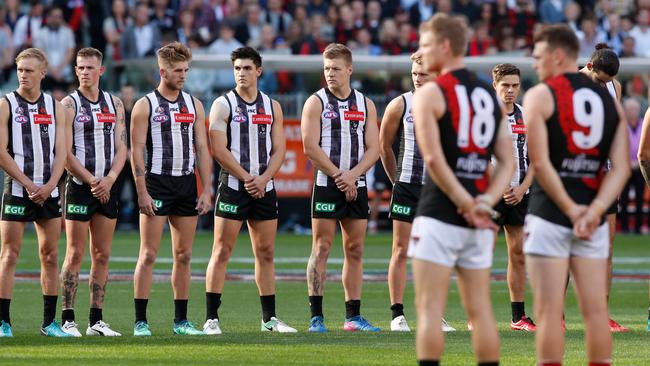
There will be no Anzac Day march either but that should not inhibit the moments of reflection and memory.
Footballers have always been prominent when the history of Australian service has been regaled.
It was a Norwood footballer, Philip de Quetteville Robin who performed with valour and distinction on April 25, 1915.
Along with another South Australian, Arthur Blackburn, Robin, on that day, bravely advanced further inland against the Turkish defenders than any Australian would for the duration of that wretched, ill-fated campaign.
Tragically, three days later he was killed. Blackburn would later, on the western front, be awarded the Victoria Cross for valour.
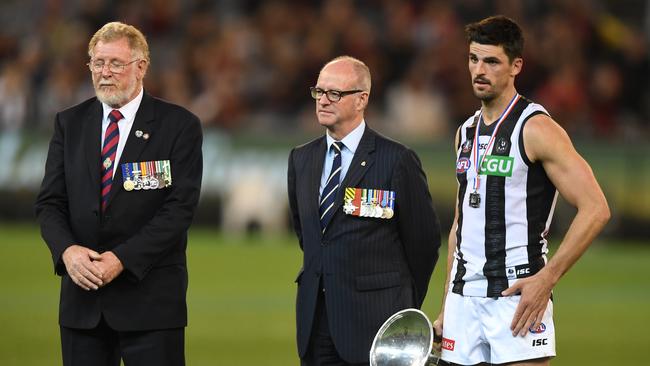
He returned to Adelaide to live a distinguished public life as a juror and politician – one that was interrupted by World War II and internment in a Japanese POW camp. Robin was a state player and a Norwood club champion before the war took his life. He was the embodiment of a young man who made the ultimate sacrifice.
After each Anzac Day march a small group of us make our way slowly to the Vietnam War Memorial alongside the Torrens Parade Ground. Bobby Hughes’ name is inscribed on a memorial paving stone in front of the monument.
There’s one for Allan Aldenhoven too who succumbed in 1979 to the mental demons that so afflict many returned servicemen.
It’s a small moment of reflection for Australian soldiers who “will grow not old.” It would be nice to think that in some small way, their sacrifice inspired a group of young footballers who are fortunate enough to never know the horrors of war.
That is the true significance of Anzac Day.
Originally published as The absence of Anzac footy games gives us all a chance to reflect on the true meaning behind the day
